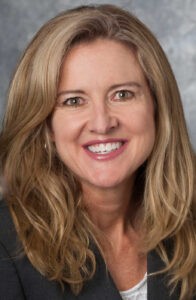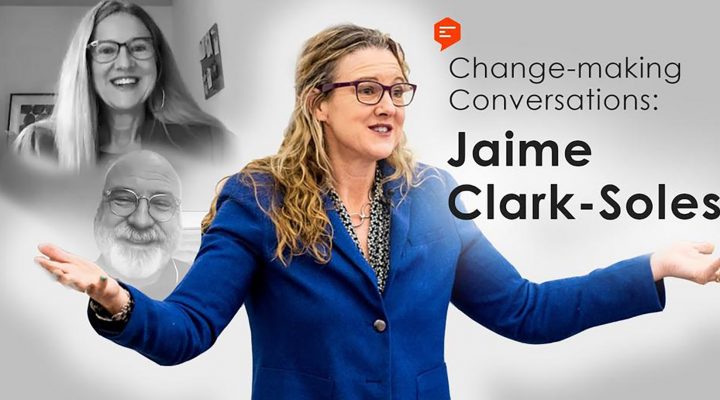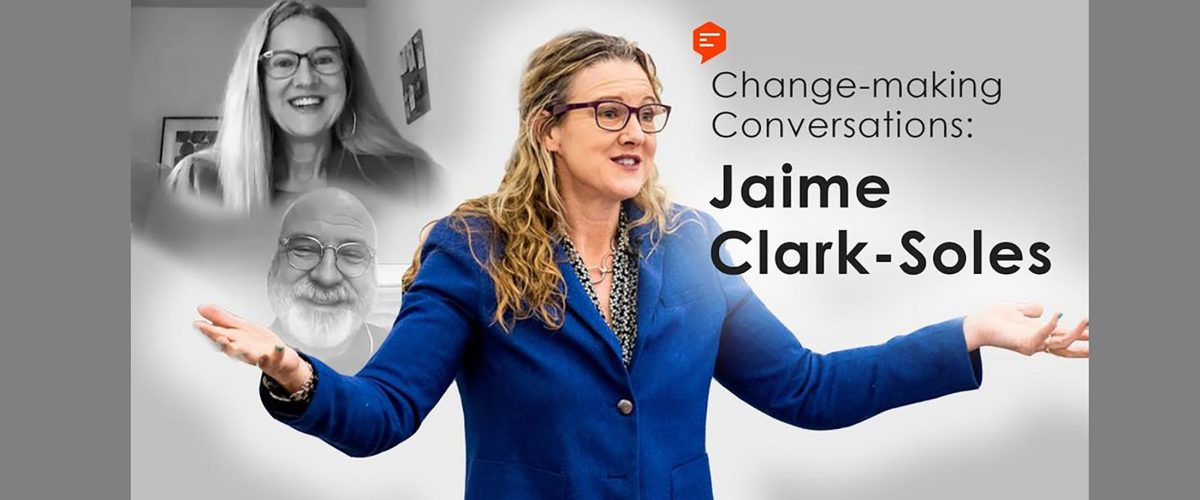Seminary professor and Baptist minister Jaime Clark-Soles underwent a deep spiritual transformation during a clinical trial with psychedelics that drew her closer to Christ, enhanced her understanding of Scripture and inspired her to write and speak widely about the experience.
“I did encounter God in beatific ways. I experienced awe, majesty, transcendence, humility, belovedness — all stuff I already believed and have experienced in bits throughout my life. But this was fully embodied from my head to my toes, having the Holy Spirit,” she said during a “change-making conversations” webinar hosted by Baptist News Global and moderated by BNG Executive Director Mark Wingfield.
Clark-Soles is professor of New Testament at Perkins School of Theology, a United Methodist seminary where she also serves as director of the Baptist House of Studies. She is a member of Royal Lane Baptist Church in Dallas.

Jaime Clarke-Soles
In 2017, Clark-Soles participated in a Johns Hopkins University study on psychedelics and spirituality. She and more than 20 other Christian, Buddhist, Jewish and Muslim volunteers participated in two psilocybin sessions of six-to-eight hours in length to measure the interplay between hallucinogens and faith.
Clark-Soles’ experience propelled her headlong into working with other clergy and scholars to study and promote the benefits of psychedelics for emotional health and spiritual development. She speaks widely on the topic, penned “Psychedelics, the Bible, and Divine” for the journal Religions, and is working on a book titled Psychedelics and Soul Care.
The highly monitored and controlled dosages of psilocybin administered in individual sessions had numerous unexpected and positive effects, including a deepened sense of compassion and a call to a spiritually liberating practice of forgiveness, she said.
“I really understand the indwelling of the Holy Spirit physically in my body and what that means.”
“I really understand the indwelling of the Holy Spirit physically in my body and what that means. I learned a lot about myself and my soul. I really connected to myself. I learned about some things I needed, some areas I needed to develop in.”
Clark-Soles said she also had “exceptional encounters with God” and other highly visual and profound visions often associated with psychedelics — but in her case rooted deeply in her faith as a Christian and thorough knowledge of Scripture.
“At one point, I was in this very kind of John 14, ‘in my father’s house, there are many mansions’ kind of structure. It was beautiful and bright and crystalline, and I was seeing these faces of people I love beheld in this big space full of light. It was really, really amazing.”
One of the people she encountered in the vision was a mentor whom she had not seen in some time, only later to learn he had died during her psychedelic session.
One person on the webinar asked if the sessions changed her understanding of any particular Scripture passages.
“Yes, in a certain way. I love Scripture, and it’s where I hang out,” she responded. “It gave me insight into the Scriptures from the inside out, instead of outside in. A number of times I thought of Romans 12:2, ‘Do not be conformed to this world, but be transformed by the renewing of your mind.’ I’m like, this (experience) is what Paul’s talking about!”
“It gave me insight into the Scriptures from the inside out.”
Clark-Soles said she came away from the sessions seeing that Paul was a true mystic.
“I walked through Paul’s experience, in Second Corinthians 12, of his own mystical experience,” she explained. “He wanted to be healed of the thorn in the flesh, but it wasn’t healed. He experiences God, he goes out of his body. This is this an amazing, exceptional, mystical experience, but it’s not all fun and games and he has to figure out how to both be grateful for that exceptional encounter with God and then also integrate the fact that what he wished for wasn’t meant to be.”
Indigenous communities around the world have long seen the value of using hallucinogens and have developed the communal traditions needed to guide the users of psychedelics, she said, adding that Christians can both learn from those ancient practices and delve into the gifts of their own faith. “We have the container for these kinds of experiences a lot like our indigenous siblings do. And one of the features of that is our focus on community. We don’t expect you to go have a spiritual experience all by yourself.”
Likewise, the John Hopkins study and other experts promoting psychedelics for spiritual development warn against doing so alone — much like Scripture values the fruits of the spirit only when used in service to the community, she said.
“Your description makes me think of what the Apostle Paul writes about glossolalia in the early church,” Wingfield said. “There’s got to be an interpreter. It can’t be just you to have this ecstatic experience. There’s got to be some fruit from it.”
“That’s exactly right,” Clark-Soles said. “At the end of the day, does your religious experience tie you more to other people, connect you to your community? Is it grounded in some kind of tried-and-true tradition? And does it create in you the desire and equip you to serve God’s world?”
“At the end of the day, does your religious experience tie you more to other people, connect you to your community?”
The movement to combine hallucinogens and faith is building on that idea by calling for the development of psychedelic chaplains, Clark-Soles said. “Chaplains are very well set up to guide in these spaces because the way they’re trained is inter-religious. They are taught to not impose their religious beliefs, but to hold space. So, it’s a new track for people who want to specialize in this so that they can be part of a practice.”
The Emory Center for Psychedelics and Spirituality is abandoning the title “chaplain” for this ministry in favor of “spiritual health clinician” or “spiritual health practitioner,” she said. “We are going to need 30,000 psychedelic therapists by 2030, let alone chaplains.”
But hallucinogens are by no means required to have life-changing spiritual insights, Clark-Soles added. “There are people who should not get anywhere near psychedelics. You don’t need psychedelics to have profound, embodied encounters with God.”
Nor is it being implied the therapy makes recipients better Christians than other believers, she said. “I would never push or encourage anybody to do psychedelics. No one needs to. You can attain these states in other ways — breath work, fasting, drumming, all kinds of ways to do this kind of soul work. I want to be clear about that.”
Nevertheless, churches and religious leaders need to know about psychedelic therapies because their members will be increasingly curious as word about the spiritual use of psychedelics grows. Clark-Soles said her new book will tackle that issue.
“At the very least, the church needs to not stand in the way of medical and therapeutic healing. I want to write the primer to get all the basics down and then say, ‘Let’s have a more meaningful conversation.’ Pastors need to understand people who are coming and asking and are, in fact, having these experiences.”
The book also will present the spiritual formation piece of psychedelics, she said. Christians “have a long tradition of mystical experiences. We know how to host these conversations. Then again, we need to reconnect with the body and focus on transformation … healing and wholeness for ourselves and creation.”
Currently psychedelics such as psylocibin are not legal for routine use in the United States. However, that is likely to change, the professor said, and is being advanced in particular by therapeutic treatment of PTSD in soldiers.
Watch the full vide of the webinar here.
Related articles:
Baptist scholar speaking and writing about her experience in psychedelics trials
The Psychedelic Renaissance needs a Christian counterculture | Analysis by Kaleb Graves


